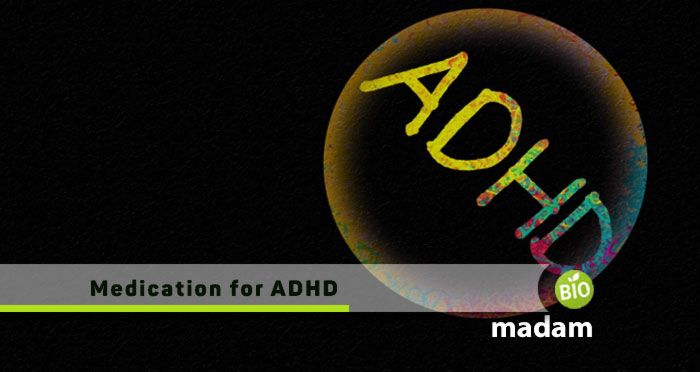Disclaimer: The information in this article is solely for educational purposes and is not a substitute for physicians. Patients are advised to consult physicians for diagnoses, prescriptions, and treatment. biomadam isn’t responsible for any risks or issues with using or the following advice.
ADHD is a mental disorder that affects many people, but there are various different types of medications to help with it. Here we will talk about the three major categories-stimulant, non-stimulant, and combination medications. Stimulants can be used as standalone or combined with other stimulants for higher coverage. Non-Stimulants only require one pill per day, whereas Combination Medications need two pills at once, usually taken in the morning and evening, respectively.

What is ADHD and How Does it Affect People
ADHD stands for Attention Deficit Hyperactivity Disorder. It’s a mental disorder that affects many people, but the severity of the disorder varies from person to person. ADHD can become an issue in school or at work because sufferers are usually hyperactive and have trouble focusing on tasks. There are various different types of medications available to help, but finding the right one can be difficult.
However, there are three major categories: stimulant, non-stimulant, and combination medications. Which method might be the best for you depends on the effects you expect from your medication. Stimulants are one type of medication that can be taken as a standalone or combined with other stimulants for higher coverage. Non-Stimulants only require one pill per day, whereas Combination Medications need two pills at once, usually taken in the morning and evening, respectively.
Difference Between Non-Stimulant, Stimulant, and Combination Medications
Non-stimulants are medications that fight ADHD with traditional relaxation techniques such as meditation and yoga, which can help reduce anxiety and promote a positive mood. Non-Stimulants only require one pill per day and include:
- Tolvaptan (Samsca) is a medication that stimulates the release of antidiuretic hormone (ADH), which increases water reabsorption by the kidneys, resulting in increased fluid retention. This can be used to treat ADHD patients who experience too much norepinephrine in the brain, causing them to be anxious and fidgety. Its side effects include dry mouth, nasal congestion, and diarrhea.
- Guanfacine (Tenex) is a medication that stimulates postsynaptic alpha-2A adrenergic receptors in the central nervous system (CNS). This can be used to treat ADHD patients who experience too much norepinephrine in the brain, causing them to be hyperactive and disorganized. Its side effects include fatigue, dizziness, dry mouth, blurred vision, and headache.
Combination medications are a combination of stimulants and non-stimulants, which are commonly used to treat ADHD. Stimulants can be taken as a standalone or combined with other stimulants for higher coverage. Combination medications require two pills at once, which usually need to be taken in the morning and evening respectively, and include:
- Methylphenidate (RITALIN) is a medication that stimulates the release of dopamine and norepinephrine in the brain, which can be used to treat ADHD patients who experience too much dopamine and norepinephrine in the brain, causing them to be hyperactive and disorganized. Its side effects include loss of appetite, nausea, insomnia, vomiting, stomach pain, weight loss or gain, dizziness/fainting, headache, and dry mouth.
- Lisdexamfetamine (Vyvanse) is a medication that combines d-amphetamine with l-lysine, which can be used to treat ADHD patients who experience too much dopamine in the brain, causing them to be hyperactive and disorganized. Its side effects include loss of appetite, nausea, insomnia, vomiting, stomach pain, weight loss or gain, dizziness/fainting, headache, and dry mouth.
Combination medications are commonly used to treat ADHD because they can be effective in reducing hyperactivity and impulsivity. The medication is usually taken once daily (usually in the morning), with an option for an extra dose to take later in the day. The side effects vary depending on which combination you decide to try, but there are usually major side effects with stimulant medications.
Which Medication is Best for me?
The first step is to consult your doctor and explain your symptoms so they can help you find an option that works best for you. If you can’t think of anything that works, it’s a good idea to ask your doctor for a list of pros and cons for each medication. There are no generic medications, so be sure to talk about costs with your insurance provider before making any decisions.
How do I Know Which Medication is Working?
You should always consult your doctor to determine the effectiveness of a medication. It takes time for your body to adjust to new substances, so don’t be discouraged if you feel no effects in the beginning. If you aren’t seeing any changes after six weeks or so, talk to your doctor about changing medications and let them know how it’s affecting you.
How do I Take My Medication?
Be sure to take your medication as prescribed by your doctor. If they gave you instructions that say take it with food, then don’t forget or don’t suddenly stop taking it on your own! It’s also important to monitor yourself for withdrawal symptoms if you suddenly stop taking your medication, which could cause a relapse of ADHD signs or symptoms.

ADHD is a childhood disorder that can continue into adulthood. There are many different treatment options available for ADHD, but no one medication will work for everyone with the condition. For this reason, it’s important to speak to your doctor about which medications may be best suited for you before beginning any treatments or therapies.

Hi, they call me Jenna, and I am also known for achieving a gold medal during my Ph.D. in science life. I always had a dream to educate people through my utmost writing hobby. So, I chose this blogging path, and Biomadam gave me this opportunity to present for them. I now stand to entertain you. Continue reading my articles & discuss if you’ve any confusion through the comment section below.

